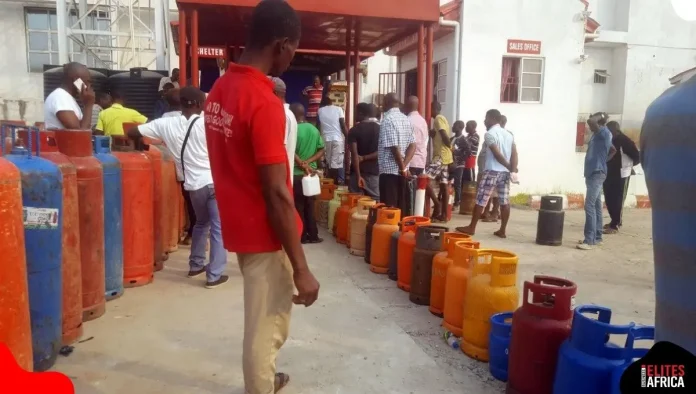
Nigeria’s state oil company, NNPC Ltd, says last week’s PENGASSAN strike squeezed national gas supply and helped push up retail prices of cooking gas (LPG) across major cities.
The walkout, sparked by a labour dispute at the Dangote Refinery, was brief, but it cut output sharply and sent a ripple through depots and roadside refilling points, according to company disclosures and market checks.
What changed at the pump
After the disruption, many outlets in Lagos sold 12.5 kg refills in the ₦26,000–₦27,000 range (roughly ₦2,080–₦2,200 per kg), with some locations reporting higher spot prices in scarcity pockets.
Abuja trailed a bit lower around ₦20,000 for 12.5 kg, but still above recent levels, an increase retailers linked to tighter supply immediately after the strike.
The supply shock behind the surge
NNPC’s strike impact tally points to steep, short-term losses: about 283,000 barrels per day of crude and 1.7 billion standard cubic feet per day of gas were deferred within the first 24 hours.
Power generation dropped by more than 1,200 megawatts as gas-fed plants felt the pinch, evidence, the company warned, of how quickly an industrial action can spill into energy markets and household budgets.
After the truce, why can prices lag
PENGASSAN has suspended the strike following government-brokered talks, but retail prices do not reset overnight.
Marketers must rebuild stock, clear loading backlogs at depots, and normalise truck dispatch to inland cities, processes that often take several days. Until that cycle settles, consumers should expect uneven pricing by neighbourhood and state.
Bigger picture: fragile LPG balance
Even before the walkout, Nigeria’s LPG market was juggling local production, imports, and new domestic supply from Dangote. A short pause in flows, whether from labour action or logistics, can tip the balance and show up immediately at the forecourt.
With the strike over, steady restocking at coastal depots and consistent trucking inland are the key signals to watch for a pullback in prices in the coming days.


